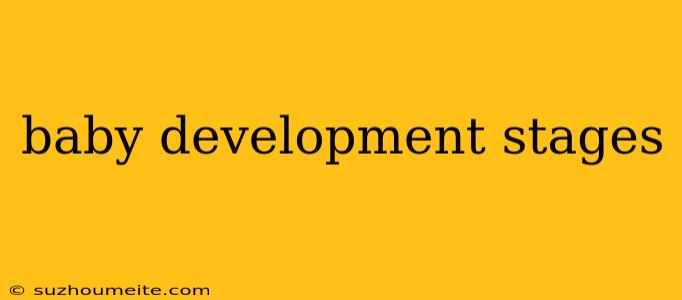Baby Development Stages: A Journey of Milestones
Babies are bundles of joy, constantly changing and growing. Understanding the stages of baby development can help parents provide the right support and nurture their little ones. This journey, from tiny newborns to curious toddlers, is filled with milestones that mark their progress.
Newborn Stage (0-3 months)
This is the time of rapid physical growth and development. Here are some key milestones:
- Reflexes: Newborns have many reflexes, like sucking, grasping, and rooting, which help them adapt to their surroundings.
- Sensory Development: Babies start to explore their world through their senses: sight, hearing, touch, smell, and taste.
- Sleeping: Newborns sleep most of the day, waking up to feed and be comforted.
- Communication: They communicate through crying, cooing, and facial expressions.
Infancy Stage (4-12 months)
This is a time of great development, both physically and cognitively. Here are some key milestones:
- Motor Skills: Babies start to roll over, sit up, crawl, and pull themselves to a standing position.
- Cognitive Development: Babies begin to understand object permanence, meaning they know an object exists even when it's hidden.
- Language Development: They start babbling, then progress to saying their first words.
- Social Development: Babies develop a strong attachment to their caregivers and start to engage in social interactions.
Toddlerhood Stage (1-3 years)
This is a time of great independence and exploration. Here are some key milestones:
- Walking: Toddlers become increasingly mobile, running, climbing, and exploring their environment.
- Language Development: Language skills develop rapidly, with toddlers using short sentences and expanding their vocabulary.
- Social Development: They develop social skills like sharing, taking turns, and interacting with other children.
- Cognitive Development: Toddlers start to understand basic concepts like colors, shapes, and numbers.
Tips for Supporting Baby Development
- Provide a Stimulating Environment: Engage your baby with toys, books, and other activities that stimulate their senses.
- Talk and Sing to Your Baby: This helps with language development and strengthens the bond between you and your baby.
- Read to Your Baby: Reading exposes them to language and develops their imagination.
- Play with Your Baby: Playing encourages interaction, social development, and cognitive growth.
- Follow a Regular Schedule: This helps your baby establish a sense of routine and promotes healthy sleep patterns.
- Be Patient and Supportive: Every baby develops at their own pace. Be patient and celebrate their milestones as they occur.
Remember, every baby is unique and will develop at their own pace. Keep in mind that these stages are general guidelines. It's important to consult with your pediatrician if you have any concerns about your baby's development. By understanding these stages and providing the right support, you can help your baby grow and thrive.
